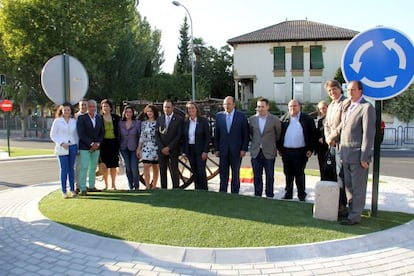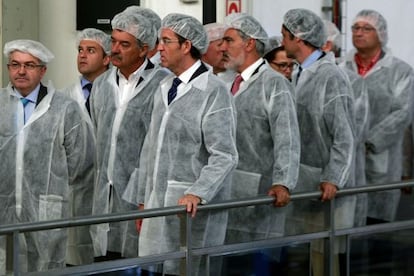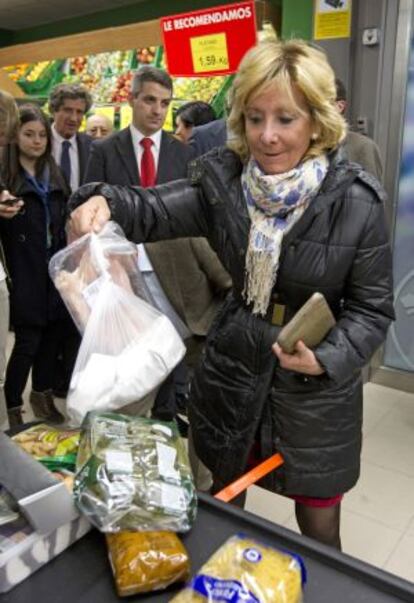Why the party is over for politicians seeking inauguration photo-ops
The construction crisis means a need to seek other ways of appearing in the press


What took place on October 11 in the small Granada town of Alhendín (population 8,000) was very telling: 14 politicians showed up for the inauguration of a new roundabout; standing side by side, they took up the entire diameter of the traffic circle. The group picture at the "Roundabout of the 14," as the intersection has since been dubbed, reflects Spanish politicians' thirst for openings and unveilings. But the crisis has slowed construction down to a near halt, and chances for photo ops of this nature are few and far between.
So what is a politician to do? A look at the recent activities of regional leaders shows a clear, unwavering trend: official visits to businesses, schools and health centers are on the rise. Visits have become the substitute for inaugurations.
What's missing are politicians with the will to transform and innovate"
For instance, Castilla-La Mancha premier María Dolores de Cospedal had to wait six full months this year before being able to inaugurate anything at all, and when she did it was a water treatment plant. The rest of the year she unveiled a couple of Civil Guard barracks, some school extensions and she even showed up in Guadalajara when a street makeover project was completed. It is not much, but still better than Balearics premier Ramón Bauzá, whose policy has practically been the opposite: instead of unveiling new buildings, he has been putting a freeze on construction work on two convention centers because of budget cuts.
Meanwhile, Alberto Núñez Feijóo has been trying to introduce a new management style that rejects the kind of pomp that long-term premier Manuel Fraga was addicted to throughout his career. Feijóo is a minimalist: "By the Galicians of today for the Galicians of tomorrow" is his slogan. He personally favors corporate visits, a style that has also been adopted by Alberto Fabra in Valencia, and, in a way, Artur Mas in Catalonia. It is a way of saying that they are standing by their businesspeople during these hard times, and that they support anything that means job creation. Juan Vicente Herrera, premier of Castilla y León, seems to like business fair openings best of all. And the head of Extremadura, José Antonio Monago, is getting ready to inaugurate a 6.5-kilometer stretch of road.

The most frequent kinds of inaugurations in recent months have involved health and education centers, with the odd hospital thrown in. In these cases, regardless of whether the politicians work for the Socialist Party or the center-right Popular Party (PP), great care is taken to stress that the project proves the government's unflagging support for public health and education. In Madrid, regional premier Ignacio González has not had many chances to show up for an opening in the year that he has been in power: some schools, two health centers and a bypass road in Torrejón. So González, just like all the others, pays visits.
"Now they go and visit companies and institutions so they can keep showing up in the press," admits Carles Ramió, political science professor at Pompeu Fabra University. "This allows them to get closer to citizens and interact with them. [...] The crisis should have been an opportunity to consider reforms and do some stocktaking on the issue of governance."

"What they're doing right now is accommodating the structure of power, getting close to intermediate organizations such as professional associations and chambers of commerce," says Ismael Crespo, director of political communications at the Ortega y Gasset Foundation. "It used to be that control was held through money, but that system is gone - even the savings banks are gone. What's missing is politicians with the will to transform and innovate. We have a political class that is mentally exhausted, who are the slave drivers of the Transition [to democracy]. They should have said, 'This is over, we need to design a new country'."
"Governing meant spending, and he who spent the most money was the one who was governing the best," adds Francisco Longo, an expert in public management at Esade business school. "But governance is not just about spending, it's also about management. [Politicians] need to learn to cut a different kind of tape. They need to communicate, they need to change their rhetoric. But this requires politicians who do not wait, who are imaginative and who do their homework."
All three experts point to the Basque Country as the region with the highest incidence of good public management. And they also underscore that the best example of the new politician is to be found at the local level: more than 3,500 municipalities ended 2012 with a surplus. These politicians are not showing up for major inaugurations, but they are doing their homework.







































